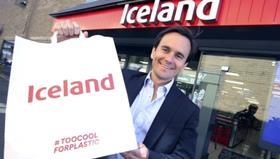
Iceland has called on the retail and wider business sector to become more transparent in their reporting of plastic packaging.
The supermarket chain has added its voice to campaigning groups Friends of the Earth, Greenpeace, A Plastic Planet and Surfers Against Sewage in their call for greater transparency, which is also supported by the Environmental Investigation Agency, Keep Britain Tidy and international development charity Tearfund.
Richard Walker, managing director of Iceland, said: “Our message is clear. Without transparency, and government-enforced reduction targets, we will not be able to judge whether business actions are delivering real progress. That is why today Iceland is calling on retailers and other businesses to step up and commit to publishing their total plastic packaging transparently, including both own-label and branded products.
'For several years now, businesses have been using incomplete information to represent the scale of their plastic packaging, their commitments to change, and the progress being made. We will all be better served by a more accurate and transparent picture on this issue.
'What we are asking from all major retailers and businesses is straightforward as they are already subject to PRN1 reporting and will be in the future to the government’s planned EPR2 scheme, so this will require no extra costs or resources. We have a huge challenge ahead that can only be solved by businesses and policy makers working together, in tandem with fully informed consumers sharing a completely clear picture of both the country and individual businesses’ total plastic packaging.'
Since Iceland made its commitment to eliminate all plastic packaging from its own-label products by the end of 2023, the retailer said it has made significant progress in reducing the plastic it uses. In total, by the end of 2019, it had removed 3,794 tonnes out of the 13,000t the business was using in January 2018, equating to a 29 per cent reduction.
Iceland's newly released figures include its primary packaging along with the secondary and tertiary packaging used to deliver food to its stores, alongside the packaging for the brands it sells, with figures reported separately for its UK and international businesses. They reveal that Iceland’s total plastic packaging footprint for its UK and international operations is over 32,000t and includes more than 1.8 billion items of packaging and almost 93 million plastic bottles.
“Our figures show that two thirds of the plastic packaging we sell relates to brands rather than own label,' Walker added. 'When we made our commitment to eliminate plastic from our own-label products by the end of 2023, we were aware that we would have to take further steps to lead the way in the fight against the scourge of plastic. That is why as well as calling on fellow retailers, businesses and the government, we are also publishing our first plastic packaging footprint to reflect both our impact and the challenge that lies ahead. We can only solve this crisis by working together.”
'Bold and brave move'
Tony Bosworth, Friends of the Earth campaigner, said: “This initiative is an important development in the drive to slash plastic pollution. You can’t manage what you don’t measure. Many corporate ambitions for reducing plastic waste may sound impressive, but unless they are clear about how much they’re responsible for in the first place these can be fairly meaningless.
“Ministers must listen to the growing calls for serious action on the plastic crisis by ensuring that bold targets for reducing plastic pollution and waste are included in the Environment Bill.”
Greenpeace UK plastic campaigner Nina Schrank added: “There’s nothing like transparency about a problem to force companies to tackle it, and that’s true of throwaway plastic too. Iceland has made a bold and brave move by publishing their plastic data, and we urge other retailers to follow suit. If UK supermarkets are underreporting their packaging, ocean plastic pollution could be far worse than we thought and wildlife could be even more at risk.
'UK supermarkets are starting to cut the amount of single-use plastic packaging they produce, but we need them to move faster and think bigger. The government can make a big difference by setting legally-binding targets, pushing retailers to cut their plastic packaging in half by 2025. Supermarkets can do it, they should do it, and the government ought to be watching to make sure that they all do it.”



